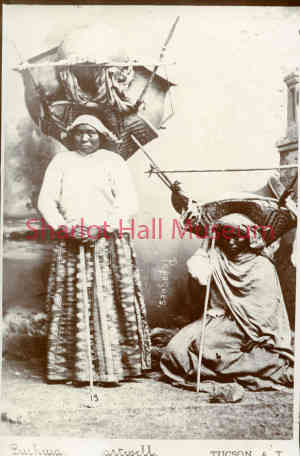Papago women with baskets of ollas
details
Buehman & Hartwell, Photographers, Tucson, Arizona Unknown inpa1107pb.jpg IN-PA-1107 B&W 1505-1107-0002 inpa1107pb Print 5x7 Historic Photographs 1890s Reproduction requires permission. Digital images property of SHM Library & ArchivesDescription
Papago women with baskets of ollas. The olla or water jar appears to be the most-used article among the present-day Papago. Many were observed beneath the ramadas of the houses, sometimes suspended from the cross-beams, sometimes placed in three-forked logs set upright in the ground. The majority of those now used are of a plain, unslipped earthenware in the natural color of the clay. Apparently a thin reddish wash is sometimes applied to the exterior. Several large storage ollas of a grayish or brownish buff, decorated in a brownish red and very suggestive of ancient Hohokam ware.
Kiahas, or burden baskets were made by Papago and Pima Indians. They were produced in a lace-like coil weave out of desert plants and were used as all-purpose carrying baskets. (Tanner, Clara Lee. “Papago Burden Baskets in the Arizona State Museum.” Kiva, vol. 30, no. 3, 1965, pp. 57–76. JSTOR, www.jstor.org/stable/30248004.)
When the Spanish came upon them, they called them Papago, but the people themselves have rejected this name and officially changed it to Tohono O'odham in the 1980s. Tohono O'odham means “Desert People.”
Purchase
To purchase this image please click on the NOTIFY US button and we will contact you with details
The process for online purchase of usage rights to this digital image is under development. To order this image, CLICK HERE to send an email request for details. Refer to the ‘Usage Terms & Conditions’ page for specific information. A signed “Permission for Use” contract must be completed and returned. Written permission from Sharlot Hall Museum is required to publish, display, or reproduce in any form whatsoever, including all types of electronic media including, but not limited to online sources, websites, Facebook Twitter, or eBooks. Digital files of images, text, sound or audio/visual recordings, or moving images remain the property of Sharlot Hall Museum, and may not be copied, modified, redistributed, resold nor deposited with another institution. Sharlot Hall Museum reserves the right to refuse reproduction of any of its materials, and to impose such conditions as it may deem appropriate. For certain scenarios, the price for personal usage of the digital content is minimal; CLICK HERE to download the specific form for personal usage. For additional information, contact the Museum Library & Archives at 928-445-3122 ext. 14 or email: orderdesk@sharlot.org.




